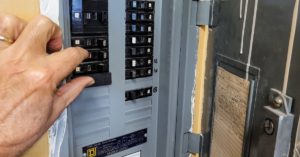Common Breaker Box Problems
Your breaker box is the central hub of your home’s electrical system. Also known as your electrical panel, the breaker box plays a critical role in distributing electricity to the right parts of your home and ensuring that any disruptions or other problems don’t damage your electrical system — or your house.
In an ideal world, you don’t usually have to think about your circuit breakers. When they’re doing their job, the most you might have to do is occasionally reset a tripped switch, which signifies that your breaker box is doing its job. But when you have breaker box problems, they can quickly become serious issues.
Signs of Breaker Box Problems
When it comes to your electrical panel, it’s important not to ignore what may seem like minor problems since those problems have a way of becoming major issues. Any time you suspect you may have a problem with your breaker box, you should immediately contact a qualified electrical contractor like MZ Electric.
Some of the signs of trouble you’re most likely to encounter include:
- Flickering lights
- Breakers tripping frequently
- Buzzing, humming, or clicking noises
- Your electrical panel feels hot to the touch
- Burning or other smells coming from your electrical panel
- Signs of corrosion
If you notice any of these signs, don’t hesitate to have an electrician perform an inspection. Putting off these repairs could put your home and your family at risk.
Most Common Breaker Box Problems
There are many problems that you could experience with your breaker box. Some are due to normal wear and tear, while others may result from shoddy electrical work. Further issues may have developed because of the increasing demands on your home’s electrical systems.
The three most common breaker box problems that electricians see in the Denver, CO area are:
1. Overloaded Breaker Boxes
Today’s homes require more power than ever. With more advanced appliances, an increasing number of TVs and other entertainment equipment, and more devices like phones and laptops requiring chargers, it’s not surprising that the modern home usually requires a 200-amp electrical panel to cope with those demands.
However, most homes built before 2000 were constructed with 100-amp electrical panels — and some older homes may only have a panel rated for 50 amps. At some point, homeowners run out of space in their panels to accommodate new circuits, and some may try to find shortcuts.
These shortcuts often leave breaker boxes looking like tangled masses of spaghetti, with wires making connections that could lead to overheating or other fire risks. Even a single double-tapped circuit breaker (a breaker with two wires connected to it) can lead to problems, especially since they’re likely to work themselves loose over time.
2. Electrical Panels that Lack Sufficient Capacity
When your breaker box isn’t rated to handle the amount of power you need to keep your home running, you’re still likely to experience problems even if you don’t cut corners and overcrowd your electrical panel.
When you’re drawing more power than your breaker box can take, your first sign will usually be flickering lights, as well as power fluctuations in other appliances. This condition occurs because your panel struggles to provide enough power to everything, so it sends out a lower amount than you need.
This setup can also lead to surges, which can trip your breakers. If your breakers are frequently tripping, it’s a good sign your panel is too small.
Finally, you may begin to notice the panel itself getting hot. When a circuit is overloaded, it tends to produce a lot of heat, which can eventually lead plastic elements to melt, increasing your risk of electrical arcs — and fires.
3. Rust and Corrosion
Steel and other metals tend to rust or corrode when they’re exposed to water, so if you see patches of orange or brown on your panel, it’s a good sign that it’s suffered water damage of some kind. It doesn’t take much water to cause this kind of damage — even excessive humidity can lead to corrosion on a breaker box.
As you probably know, electricity and water are a dangerous combination, and it’s always in your best interest to address the issue causing your electrical panel to rust sooner rather than later.
Electrical Panel Replacement and Repair
Electrical panel services are some of the most important jobs an electrician can perform. Both electrical panel replacements and repairs protect a home’s electrical system from severe damage and help keep your home safe from electrical fires.
If you’re having breaker box problems, contact your electrician to have them inspect your system. They should be able to identify the underlying cause of your issues.
Sometimes the issue may be a damaged circuit breaker, which electricians can easily replace. Other times, you may discover that your home requires more power than your panel can handle.
If your electrician determines that you need an electrical panel replacement, it’s a good time to consider what your needs are likely to be, not only at the moment but in the future as well.
Think about your power consumption, as well as where you need that power to go in your home. You may discover that your needs have changed since contractors built your home, and a breaker box replacement is a good time to make your electrical system work better for you.
Finding a Denver, CO, Professional Electrician Near Me
At MZ Electric, we’ve provided electrical solutions to homeowners in the Littleton, CO, area for more than a decade. If you’re experiencing breaker box problems in your home, you can trust our team of highly trained experts to identify and solve the problem quickly and efficiently.
When you’re looking to upgrade your electrical panel, our team of experts will help you choose equipment that will best fit your needs — and your budget. We’ll get your new breaker box installed fast to keep your disruptions at a minimum. Call us today to book an appointment with our courteous team.
